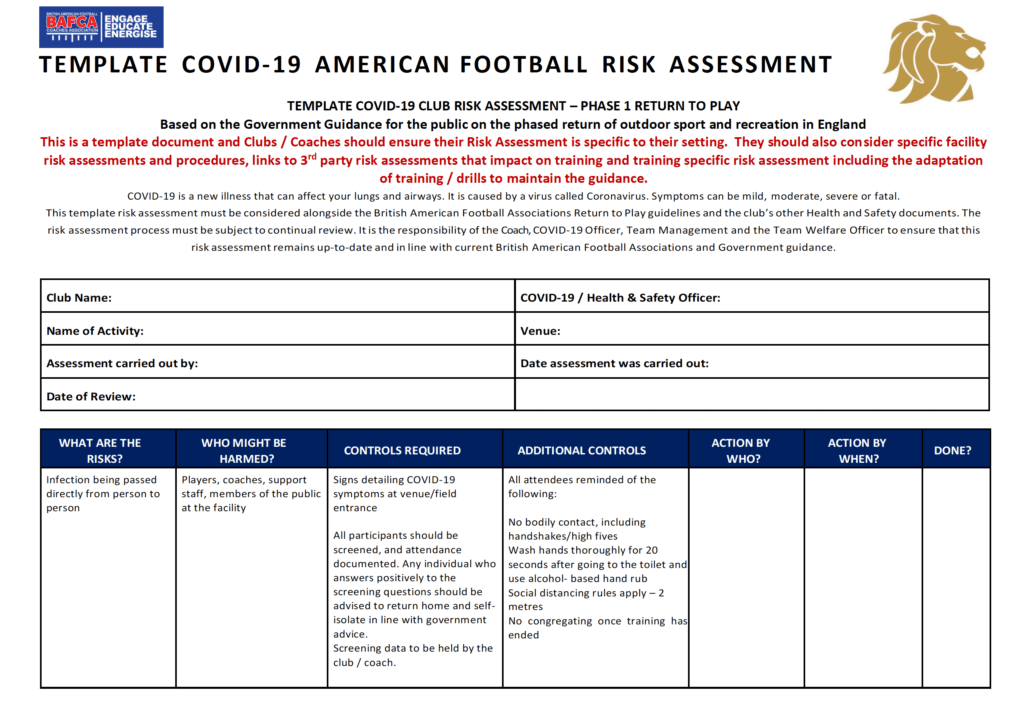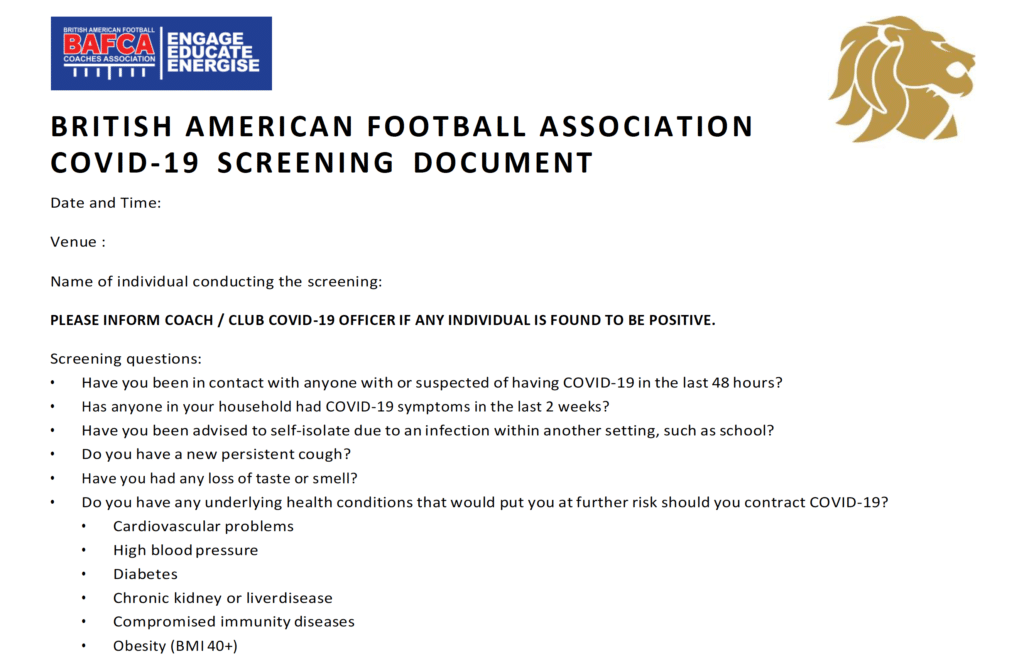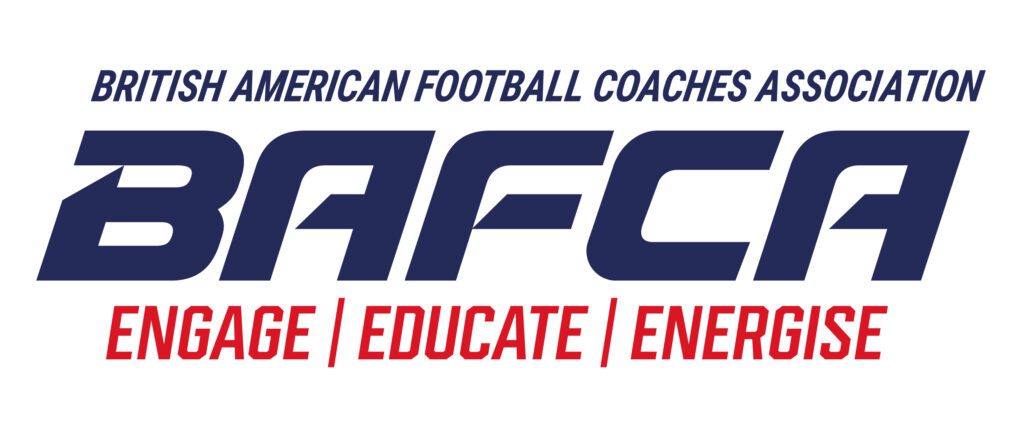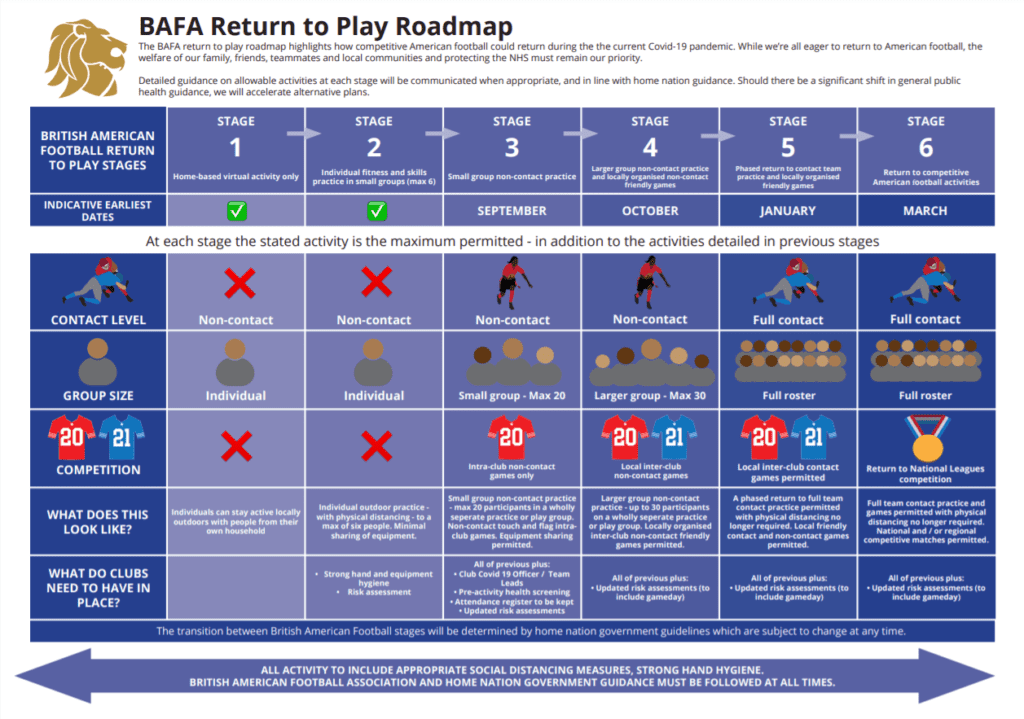
Latest Updates
- DCMS Guidance Document 1st December
- BAFA Covid-19 return to play – update (20 November)
- BAFA Covid-19 update (3 November)
- Restrictions on adult American Football activity in five Scottish Health Boards areas extended to Mon 2 Nov
- American football activity suspended in Wales from 23 Oct – 9 Nov
Sunday, 11th October, 2020
- Phase 4 Session Content
- BAFA Covid-19 Return to Play – Update & Stage 4
- BAFA Covid-19 Return to Play – Frequently Asked Questions
Updates for Scotland
- New Restrictions on American Football Activity in Scotland from Friday 9th October
- Return to Play Guidance for Adults Approved by sportscotland – 4 September
Updates for England & Wales
- BAFA Return to Play moves to Stage 4 from 3rd October in England & Wales
- Return to Play Guidance Approved by DCMS for England
COVID-19 Documentation
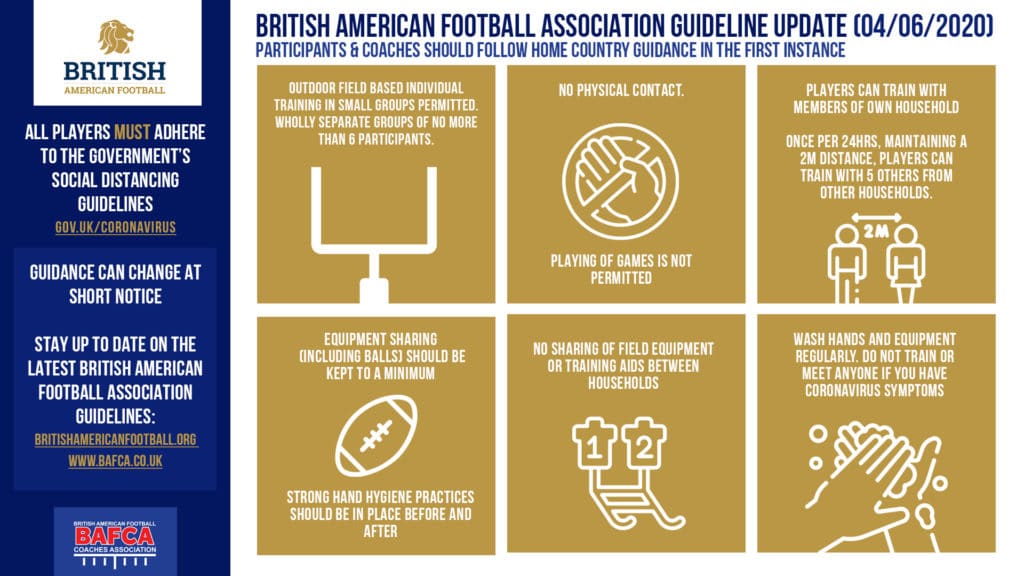
Guidance on outdoor training – Q&A
Sunday, June 7, 2020
Following release of the announcement on 4 June 2020, this Q&A provides further information
Updated guidance on American football related physical activity can be found here.
The guidance which has been issued is guidance only, and in considering a return to practice clubs need to take account of their own particular circumstances, their venue and their players. This should then be recorded in a written risk assessment, and practices should only take place where clubs are confident that this can occur in accordance with both the government guidance, and the guidance issued by BAFA.
The infographic that has been provided is designed to provide a useful summary to clubs of the principles which should underpin any written risk assessment, which should focus on social distancing, minimising the sharing of equipment (including balls) and vigorous hand hygiene.
Does the guidance apply to Scotland and Wales?
No, the BAFA guidance currently only applies to England. Different rules, and guidance, apply to Scotland and Wales. Clubs located in Scotland and Wales should comply with the guidance issued by the Scottish and Welsh governments. Players living in Scotland or Wales, but playing for a club located in England, should ensure that their travel to their clubs complies with the rules in place in Scotland or Wales, as the case may be.
What do you mean by strong hand hygiene?
Strong hand hygiene includes the ability to wash hands both before and after practice, with both soap and water, or hand sanitiser. Facilities to allow this should therefore be available in close proximity to the practice area.
Strong hand hygiene should also be maintained during practice, allowing players to wash/sanitise their hands on a regular basis, and also to allow for equipment (including balls) to be regularly cleaned. In particular, any equipment taken from storage, which may be used by different players either in the same practice, or between practices, then the equipment should be thoroughly cleaned between use.
Will contact drills (e.g. lineman drills, or tackling) be permitted?
No. All practices, and drills, should be non-contact, and further should maintain social distancing (>2m) at all times.
Can we practice tackling by using tackle bags?
No. Sharing of equipment should be kept to a minimum. Using tackle bags, with different players using the same tackle bag, is not keeping sharing of equipment to a minimum.
Can players share balls, and other equipment, if they wear gloves?
This does not assist, as the virus is able to remain on the gloves, and so wearing gloves will not reduce the spread of the virus.
What about using a ball?
Sharing equipment, including a ball, should be kept to a minimum. If passing a ball, sharing of the ball should be kept to a minimum (so the ball should be kept to being used by the same two players, and not the wider group of six). The ball should then be thoroughly cleaned after each session.
What about wearing kit?
Players should not share jerseys (e.g. if the club have shared practice jerseys). Also players should not use other shared equipment such as sharing shoulder pads or helmets.
Can we have multiple groups of six on the same pitch?
The guidance does allow for more than one group on the same pitch, if clubs can risk assess this to be safe, and in accordance with the guidance which has been issued by both the Government and BAFA. Factors to consider in any written risk assessment should include the following:
– Will groups always consist of the same six individuals? If the individuals within particular groups vary, then it is probable if one player then displays symptoms of COVID-19 then all players in the club will need to self isolate;
– When will players arrive and depart? If multiple groups of six all arrive or depart at the same time then it is likely that there will be times where there are people congregating in groups of more than six;
– Will players be collecting equipment at the same time, or from the same location?
– What about changing rooms or toilet facilities?
– Should the groups arrive, and depart, at staggered times?
The above is not exhaustive, and clubs should take into account the particular circumstances of their venue and players. This should be the basis of the written risk assessment. Unfortunately, BAFA is unable to sign off, or approve, any particular plan as BAFA will not know the particular circumstances of their venue and players. It is for clubs, and coaches, to satisfy themselves that any practice can be done in accordance with both the BAFA guidance and the government guidance in force from time to time.
Do we have to do risk assessments?
Yes, risk assessments should be carried out prior to returning to practice. The risk assessment should take account of the risks of COVID-19, and how the guidance, including with regard to social distancing, can be complied with.
General guidance on risk assessments can be found here: https://www.sportenglandclubmatters.com/club-planning/governance/managing-risk/risk-assesment/
A template for a risk assessment can be found here. This outlines some of the risks, and some suggested steps to control these risks, for American football. However, it is important that clubs do not simply print off and sign this risk assessment, and teams should consider the risks associated with their particular circumstances, including those associated with their venues, equipment, and players. If clubs do not do this, then the risk assessment will not be effective.
An example player health declaration can be found here. Team should consider using this, or a similar form, for players to complete prior to attending training.
Will clubs and coaches be insured if they return to practice?
It is important that any practice or activity is in accordance with the guidance which has been issued by BAFA, and in accordance with the government rules with regard to social distancing and lock down, to ensure that they continue to benefit from the BAFA insurance policy. If an issue, or a claim, arises then teams will need to demonstrate to the insurers that the activity was in accordance with the guidance issued by both BAFA and the government and, for example, all necessary written risk assessments had been completed. An inability to do this could invalidate the claim, and could expose coaches and clubs to personal liability.
